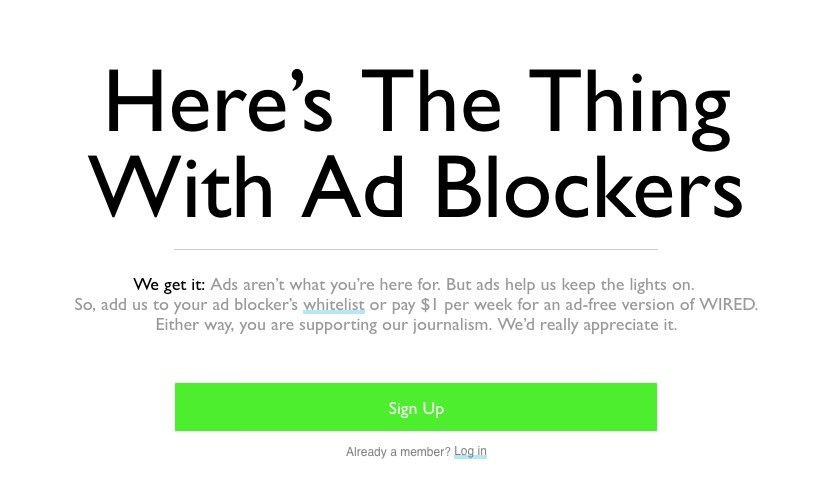Here's the thing about ads
07/04/2016
My very real internet friend whom I have never met, Jaci (protected account, but everything you need to know for this article is here), tweeted this thing today that pissed me off. I'm not mad at her; I'm mad at Wired. I'm also mad at ads, but not because I inherently hate advertising - because I hate all the underhanded, sneaky snooping that ad networks do to show relevant adverts to you.
To be technical for a second, ads are usually displayed on a website by embedding a bit of someone else's JavaScript. Every time a page loads on that site, that bit of JavaScript calls back to where it came from and, with the help of a cookie, says "hey, I've got this person here - what ad fits their profile?".
Now, you might be thinking "how much can this website know about me? I just got here" - well, that website you're on probably isn't the only website that has that code embedded on it. There are probably a lot of other sites with that code on. And every time you visit one of those sites, that ad provider makes a note of it, associates it with your browser, and can make a list of every site you've ever visited with that browser (save for a few cookie clearances here and there - we all regularly clear our cookies, right?).
The neat thing about JavaScript is how powerful it is. It can be used to add predictive search to a text field, it can be used to produce interactions when you move your mouse around, and it can be used to create effects when you scroll. The bad thing about this, is that it can be used to log every key you press on a website, track what you hover over when you move your mouse, how much you scroll, and how much time you spend. Security concerns notwithstanding, if you let me put some JavaScript on your website (which some of you do, and I'm grateful for your trust and I swear I don't abuse it), I can record anything your users do on your site that I think is interesting. You would probably never think to look, and your users probably wouldn't even notice.
Now, let's ramp it up a little with Amazon. You might have seen Amazon's ads on sites before. They probably show you stuff you've looked at recently. It's really smart and really simple, and they're building the best profile they can of you by how many websites they can convince to host their ad code. So when I read a review for Yokai Watch on Kotaku, Amazon can go "Yokai Watch, eh? We have that product! Show him an ad for it". This works, and where an ad network wouldn't be able to link your browsing habits to an individual, Amazon can. And they have a tonne of other information about you and your family and the products you buy. They're able to build a pretty decent profile of you, but their ad network isn't huge compared to their shop, so it's not a huge issue.
The funny, and mildly technical, thing about this is that they can do it even if you log out. You know when you go to Amazon and they say "Hey Whatever Your Name Is" but to do anything you need to supply your password? This is called "soft login" and it's a technique sites use to identify you as soon as they can, and for as long as they can. So if you log out, Amazon still keep you cookied until you log in as someone else or manually clear your cookies. So they know who you are the whole time unless you expressly tell then you're someone else, or no-one. Pretty creepy.
Now let's ramp this up as far as it goes: Facebook. Facebook is the biggest ad network in the world, and it only advertises on one site (to the best of my knowledge). It's the biggest because of two things:
- You (if you have an account)
- The Like button
How many sites do you see the Like button on? How many do you not see it on? It is everywhere. Even if you've never clicked it before, it doesn't matter. If you visited a webpage and the Like button was there, and you were logged in to Facebook, Facebook knows you visited that page, and they kept a record of it. Yep, even the porn site you didn't use private browsing on. Even the BitTorrent site you downloaded Game of Thrones from. They know.
Fortunately for you, if you're in prison, you're no good to Facebook, so they're probably going to be cool about it. Their interest is in being able to say to companies "look at how much we know about this person. We know this much about most of the internet-connected world. If you pay us money, we'll send good leads your way from our website: the most popular website on the planet".
So there you have it: the thing about ads. Most people don't care, and that's fair enough, but there are a growing number of people who do care and don't like the idea of all their browsing habits being recorded and bound to them by a third party. And that's why they block ads.
If you're interested in blocking ads, you could look at browser extensions for your desktop browser (Ghostery and ublock in Chrome and Safari) or iPhone (1Blocker). If you have suggestions for other platforms, please tweet them at me.
Update
- @AdamBurv recommends that you use Privacy Badger with ublock
- I realised that you can get Brave for iOS as well as the desktop.
